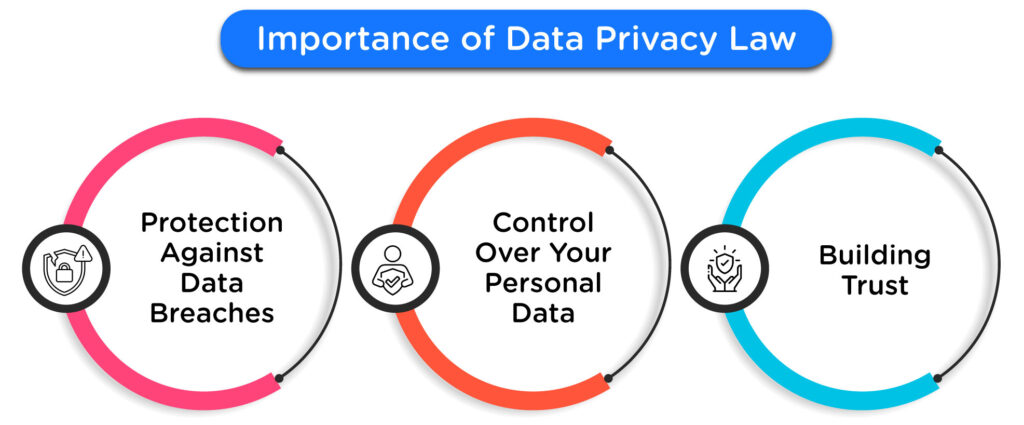Data privacy has become an important term today as we share a lot of personal information online. Thus, keeping our data private is of utmost importance. When we use the internet, do online shopping, or use social media, we provide our personal information there such as our names, email IDs, location, even the internet knows our shopping habits or patterns too. This creates the risk of cyber threats and raises the concern of losing or leaking personal data.
That is why many countries have made laws to protect your personal information. These laws make sure that companies handle your data properly. These are called data privacy laws. In this blog, we will learn about data privacy laws and their importance.
Data Privacy Laws: You Need to Know
Data privacy laws are specific regulations for managing or controlling how organizations collect, store, and use personal information. This information ranges from name and address to a phone number or email. These rules may be different in a country or region regarding the protection of personal data. These ensure that companies take steps to secure a user's data and provide proper guidelines on how to use them.
For example, in 2024, according to the resources report, nearly 138 countries will have already implemented data and consumer privacy laws.
Importance of Data Privacy Law
Data privacy laws are important for different reasons:

1. Protection Against Data Breaches
The data privacy law prevents your organization from losing valuable information. Losing sensitive information leads to the misuse of that information for malicious purposes, such as identity theft or fraud.
2. Control Over Your Personal Data
Data privacy laws allow users to control their personal information. They force companies to get permission from the user before they can collect and use their information. Moreover, they have a right to see what information a company has regarding them, and sometimes, a user can ask to delete that information.
3. Building Trust
As a user can see personal information is not leaked, that will build a certain level of trust in them for the organizations they would deal with. The companies then demonstrate that it does care for their privacy if data privacy law enforcement is met by them to ensure protection; users feel better while interacting.
Key Data Privacy Laws a User Should Know
There are some of the key data privacy laws across the world. Here are a few key ones:
General Data Protection Regulation (GDPR)
The GDPR was proposed by the European Union in 2018. It is considered to be one of the best laws among all the data privacy laws. It applies to any company that handles the personal information of citizens of the EU, no matter where the company is located. The main points of the GDPR include:
- Control Over Data: Individuals have greater control over their personal information. Companies have to obtain explicit consent before collecting any personal data.
- Access to Data: The user can view their data, correct errors, or delete the entire thing.
- Notification of Breach: In case of data breach, companies have to inform users regarding the theft or breach of their data.
- Penalty for Non-Compliance: In case an organization fails to follow these guidelines, they have to pay huge penalties.
As per resources, more than 79% of organizations in the EU follow the GDPR.
California Consumer Privacy Act (CCPA)
The CCPA is one of the legal laws in California, USA, under which consumers obtain more control over their personal information. It aims at businesses that collect personal data about California state residents. The principal points of CCPA are,
- Rights of the Consumers: Subject to data must have three central rights:
- Demand Access: Request to view a business's copies of personal information it has compiled about you.
- Demand Deletion: You may request the company to delete the personal data.
- Opt-out of Sales: You can add yourself to the sale opt-out list so that it will no longer sell your information to other businesses.
The CCPA has strongly impacted American companies handling data privacy since it acts as a guide to other states aiming to develop comparable legislation.
Personal Data Protection Act (PDPA)
The PDPA is Singapore's law on handling personal data. Key features of the PDPA include:
- Consent Requirement: Organizations should get consent from people before collecting their personal data.
- Data Protection: Organizations are authorized to protect personal data from unauthorized access.
- The Rights of Individuals: People can access their own data and request corrections if there are mistakes.
This law protects personal information in a responsible way and lets individuals control their data.
Data Protection Act 2018 (DPA)
DPA 2018 is a UK law that addresses how personal data should be managed. It operates almost identically to the GDPR, with its core aim to protect individuals' private lives. The main DPA points include:
- Alignment with GDPR: DPA operates with GDPR to have solid data protection.
- Breach Reporting: Organizations should report cases of data breaches.
- Users can Handle Data: The rights of an individual concerning the handling of personal data are protected by law.
This will help in treating users’ personal information with more care and maintaining the privacy of the people.
How Data Privacy Laws Affect User
As a consumer, data privacy laws allow you certain rights. Though these vary by country and region, the general rights are as follows:
- Access to Your Data: Users can ask companies what personal information they have collected about them.
- Right to Deletion: Users can request that companies delete their data if they wish no longer to store it.
- Control Over Consent: User should have the right to consent or withdraw their consent regarding their data. Users may request a correction if their data is incorrect.
These rights are meant to place the user in control over personal information, thereby protecting their privacy.
Implementation of Data Privacy Laws by Companies
Companies must follow these regulations and take proper care of their personal information. They need to be open about how their data is being collected, used, and distributed. Many firms have developed their privacy policies and stated what information they collect and for what purpose they will use the data.
Additionally, companies must provide protection for your data through security measures such as encryption, secure storage, and regular security audits. If a company fails to protect your data and it gets breached, they may face fines or penalties under these laws.
Final Thoughts on Data Privacy Laws
Complying with the data privacy laws is the best way to protect your personal information. These laws provide the control you seek over your information, prevent any misuse, and ensure companies will act responsibly with your data. As technology becomes more advanced, data privacy law will remain vital in protecting the privacy of consumers. Stay educated on these issues and your rights so that your personal data can be treated properly.
For more such informative blogs, visit us at SecureITWorld!
FAQ
Q1. What are the four basic principles of data privacy?
Answer: The four basic principles are that data must be collected legally, used only for its intended purpose, kept to a minimum, and kept accurate and up-to-date.
Q2. What are the seven general data protection regulations?
Answer: The seven GDPR principles are lawfulness, fairness, transparency, purpose limitation, data minimization, accuracy, and accountability.
Q3. What are the three main acts of data protection?
Answer: The three main acts are the General Data Protection Regulation (GDPR) in the EU, the California Consumer Privacy Act (CCPA) in California, and the Personal Data Protection Act (PDPA) in Singapore.
Q4. What are the ten key requirements of GDPR?
Answer: The ten key requirements include getting consent for data collection, protecting data by design, ensuring individuals can access or delete their data, notifying about data breaches, appointing a data protection officer, conducting impact assessments, ensuring accountability, securing data, managing international data transfers, and keeping records.
Recommended For You:
Data Protection for Small Business: Easy Steps to Take
Data Breaches: How do you protect your company’s valuables?





